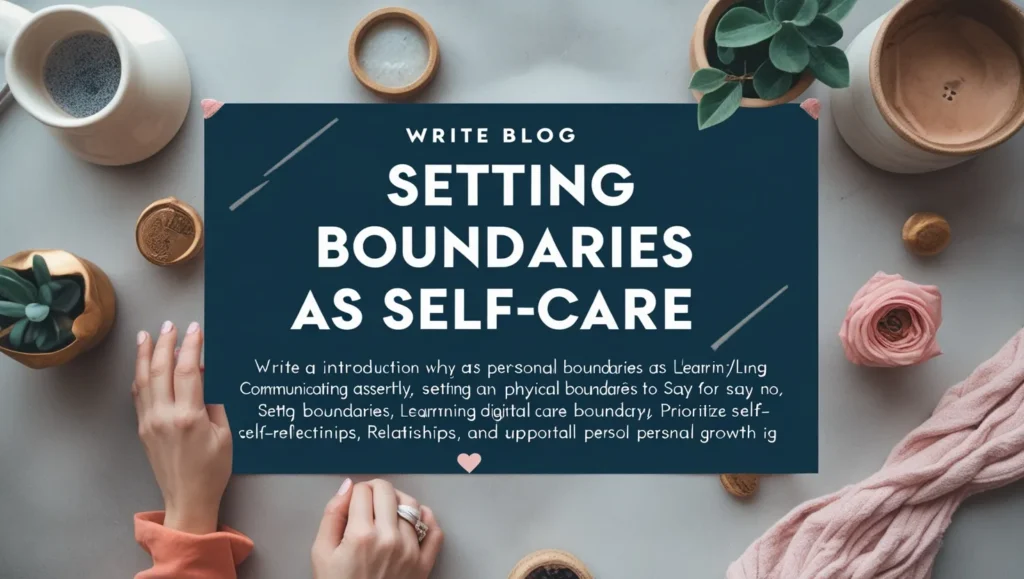Setting Boundaries as Self-Care
In our fast-paced world, saying “yes” to everything and everyone can feel like a badge of honor. However, constantly prioritizing others over yourself can lead to stress, burnout, and emotional exhaustion. That’s where boundaries come in. Setting boundaries is a vital form of self-care that protects your mental, emotional, and physical well-being. It allows you to manage your energy, maintain healthy relationships, and create a life aligned with your values.
Boundaries are not about pushing people away; they are about creating space for yourself to recharge, focus on your goals, and interact with others in a healthy, balanced way. By understanding, establishing, and maintaining boundaries, you can cultivate self-respect and stronger relationships.
Here’s a comprehensive guide with practical steps and tips for setting boundaries as self-care.
1. Understand Your Needs and Limits
Before you can set boundaries, you need clarity about what you need and what drains you.
- Identify situations that cause stress or discomfort.
- Recognize your emotional, physical, and mental limits.
- Ask yourself: “What do I need to feel safe, respected, and supported?”
💡 Tip: Journaling your feelings can help pinpoint patterns where boundaries are necessary.
2. Communicate Clearly and Assertively
Boundaries are effective only when communicated.
- Use “I” statements: “I feel overwhelmed when…” instead of blaming.
- Be direct, calm, and confident in expressing limits.
- Avoid over-explaining; your needs are valid.
3. Prioritize Self-Care Activities
Boundaries help carve out time for self-care.
- Schedule regular breaks, exercise, hobbies, or meditation.
- Protect personal time from work, social obligations, or digital distractions.
- Say “no” without guilt when commitments interfere with your well-being.
4. Learn to Say No
Saying “no” is a powerful act of self-respect.
- Practice saying no politely but firmly.
- Understand that declining does not make you selfish.
- Recognize your limits — overcommitting reduces your effectiveness and happiness.
5. Set Digital Boundaries
Technology can blur lines between work, social, and personal life.
- Limit screen time and notifications.
- Set specific times for emails, messages, and social media.
- Avoid checking work devices during personal or family time.
6. Manage Emotional Boundaries
Protect your emotional energy from being drained by others.
- Don’t take responsibility for other people’s emotions or problems.
- Recognize toxic behaviors and step back when needed.
- Practice empathy without compromising your own well-being.
7. Establish Physical Boundaries
Physical boundaries ensure personal comfort and safety.
- Communicate personal space preferences clearly.
- Respect your own need for privacy or alone time.
- Create a comfortable environment at home or work.
8. Maintain Boundaries Consistently
Boundaries are effective only when consistently enforced.
- Remind others politely if limits are crossed.
- Avoid bending rules repeatedly out of guilt or fear.
- Adjust boundaries as your needs evolve over time.
9. Surround Yourself with Supportive People
Boundaries are easier to maintain when your environment is supportive.
- Engage with people who respect your limits.
- Distance from relationships that consistently drain your energy.
- Seek guidance from mentors, friends, or therapists when necessary.
10. Practice Self-Reflection and Adaptation
Boundaries are not static — they require self-awareness and flexibility.
- Reflect regularly on what works and what needs adjustment.
- Celebrate small wins when you successfully uphold your boundaries.
- Be patient; learning to protect yourself is a continuous process.
Final Thoughts
Setting boundaries is not a one-time task; it is an ongoing practice of self-care, self-respect, and personal empowerment. By understanding your limits, communicating assertively, and prioritizing your needs, you create a life that supports your mental, emotional, and physical health.
Boundaries enhance relationships by promoting respect, clarity, and mutual understanding. They give you the freedom to say “yes” to what truly matters while protecting yourself from burnout and unnecessary stress.
Remember: setting boundaries is an act of self-love, not selfishness. The more you practice, the more confident you become in honoring yourself — creating a life that feels balanced, fulfilling, and genuinely yours.

